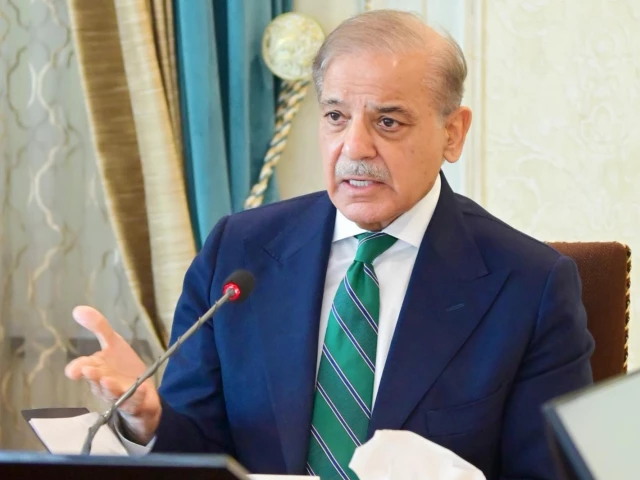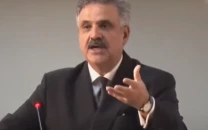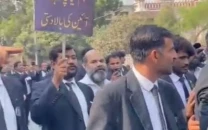PM proposes KSA, UAE as venues for Pak-India talks
Shehbaz expects US to play a key role in facilitating dialogue

Prime Minister Shehbaz Sharif said on Wednesday that Kingdom of Saudi Arabia (KSA) or the United Arab Emirates (UAE) could be considered potential venues for any future dialogue between Pakistan and India, with the United States playing a key role in facilitating the negotiations.
Pakistan's national security adviser/DG ISI would represent the country in any such talks, he confirmed.
The premier made these remarks while talking to senior journalists in the federal capital.
Tensions between Pakistan and India escalated on April 22 after New Delhi accused Islamabad of carrying out an attack in IIOJK's tourist spot Pahalgam, killing 26 people.
Tensions further escalated in the early hours of May 7, when missile strikes hit six cities in Punjab and Azad Jammu and Kashmir (AJK), destroying a mosque and killing dozens of civilians, including women, children, and the elderly.
In a swift military response, Pakistan's armed forces shot down Indian warplanes, including three Rafale jets, widely regarded as a key asset of the Indian Air Force.
The confrontation intensified again in the early hours of May 10, when India targeted several Pakistani airbases with missile strikes. In retaliation, Pakistan launched Operation Bunyanum Marsoos, damaging Indian military installations, including missile storage sites, airbases, and other strategic targets.
During a discussion with journalists, the prime minister said Pakistan would choose either Saudi Arabia or the UAE as the venue for future talks with India, with the US playing a major role. He added that the national security adviser/DG ISI would represent Pakistan in the negotiations.
He emphasized the need for mediation in Indo-Pak talks by international stakeholdersincluding Saudi Arabia, the UAE, and particularly the United Statesand said that any future negotiations must include a comprehensive agenda addressing core issues such as Kashmir, water, trade, and terrorism.
Speaking about the recent conflict with India, the prime minister noted that Pakistan's armed forces had fought bravely against the enemy.
He maintained that an agreement was reached during communications between the Directors General of Military Operations (DGMOs) of both countries that their respective forces would return to pre-conflict positions. However, no timeline has been set for the withdrawal, he said.
The prime minister recalled that during his address at Kakul Academy, he had invited the international community to conduct an open investigation into the Pahalgam attack. He said Pakistan's neutral stance was acknowledged and the offer was accepted globally.
When asked if Israel had supported India during the conflict, Shehbaz responded affirmatively, citing reports that indicated Israeli presence and assistance. "Despite this, we achieved victory through God's grace," he said, adding that Pakistan used its domestically developed Juwal Fatah missile system during the conflict.
The prime minister said Field Marshal Asim Munir earned respect due to his "bravery and unwavering actions".
As a result of the army chief's resolute leadership, we requested him to take on the role of Field Marshal, Shehbaz said, adding that it was upon the government's requestnot the general's desirethat he was offered the honorary rank of Field Marshal. "General Munir's decisive command earned him respect and led us to ask him to accept this role," said Sharif.
The journalists quipped about the prime minister's own leadership role during the conflict, to which he replied with a smile, "You may call me a political field marshal".
Recalling the conflict, the prime minister said that at around 2:30 am, he received an angry call from the army chief, who informed him that India was preparing to launch an attack. "I told the army chief we had no hesitationrespond to India, move ahead," he said.
Shehbaz added that Pakistan gave a strong response to a country five times its size, far ahead in both economic and military terms. "India considered itself the SHO of the region; we shattered that arrogance. We defended the country solely for the sake of Almighty's pleasure," he stated.
He further highlighted the valor and coordination among all defence institutions, crediting air marshal and the naval leadership for strategic execution.
Shehbaz said that although Pakistan had the capability to destroy more Indian systems, restraint was exercised in order to avoid further escalation. "We do not wish for war, but for peace in the region," he asserted.
The prime minister expressed gratitude to Turkey, Saudi Arabia, the UAE, Azerbaijan, and especially China, for their unwavering support during the conflict.
He noted with amusement that Pakistan had effectively become a "marketing country for Chinese technology," reflecting on its strategic utility during the hostilities.
He affirmed that the government intends to complete its term, adding, "What happens in the future is in God's handswe are focused solely on doing our job."
He reaffirmed Pakistan's position that it has never supported terrorism, and reiterated the country's commitment to peace and prosperity in the region.






















COMMENTS
Comments are moderated and generally will be posted if they are on-topic and not abusive.
For more information, please see our Comments FAQ